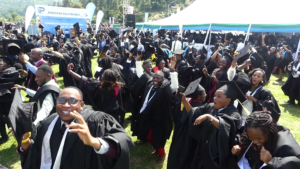By Elias Hakizimana
Institute of Policy Analysis and Research (IPAR-Rwanda) in partnership with the Partnership for Social and Governance Research (PASGR) and the government of Rwanda is implementing project to address Rwanda’s urban governance issues through secondary cities.
The project dubbed Utafiti Sera project was presented on August 31, 2021 during virtual National Stakeholders’ Forum on Urban Governance in Rwanda’s Secondary Cities.
It has been implemented since 2017.
The forum was aimed to provide a platform to discuss urban governance challenges faced by secondary cities through identifying key issues, informing, engaging and influencing government policies and practices on issues related to urban governance and development in the secondary cities.
It brought together key stakeholders from both Central and Local Government including the Six Secondary Cities, Development Partners, Civil Society, Private Sector, the Media, Research and Academia.
Jean Baptiste Nsengiyumva Senior Research Fellow, at Institute of Policy Analysis and Research-Rwanda (IPAR-Rwanda) said the project is increasin capacities in urban governance to address urban challenges.
“Urbanization is at the heart of Rwanda’s transformative economic approach. The project will increase capacities on urban governance, strengthen Utafi Sera House on urban governance and raise awareness on urban governance or urbanization issues in Rwanda,” he said.
The project, he explained, is examining the current urban governance of secondary cities and related issues to generate evidences on urban governance issues within secondary cities.
“It has to influence policy and decision makers on urban governance challenges,” he added.
Vincent Rwigamba, the Director of Housing Planning at Rwanda Housing Authority said that implementation of Secondary cities urbanization Agenda to 2050 requires coordinated efforts.
He said thatRwandan will have 35 per cent of the population in Rwanda living in urban areas by 2024.
That, he said, is expected to increase 70 per cent by 2020.
“Urbanization is an opportunity for socio-economic growth when it is planned. We need proper use of land and other natural resources, investment into infracture services and initiate local economic development,” he said.
He said that the master plans for secondary cities were reviewed in line with the national land use and de1opment master plan.
“ We have to curb down mushrooming informal settlements and unregulated settlements. Rural settlements sites have been identified and layout plans approved,” he noted.
Through RUDP ( Rwanda Urban Development project funded by World Bank, he said, 81km of roads and 44 km of drainages were constructed under phase one and phase two while phase three is under procurement.
Rwanda has also planned 9,172 hectares for industrial zones.
“Industrial parks are needed in 13 identified districts,” he said.
Cable cars in Musanze
According to Rwigamba , there must be diversified transportation modes.
These include ring roads and by-passes, express ways, trams and metros, railways and cable cars in Musanze.
Cables cars, he noted, will serve tourists.
He said bus rapid transpits will also be introduced to reduce dependency on individual cars while bicycle lanes and pedestrian walks have to be integrated.
“ Modern markets have been constructed to boost rural-urban linkages and regional trade. Cross border markets and ports have been constructed to boost trade with neighboring countries,” he said.
He said land bank for affordable housing has been done in secondary cities and affordable houses developed in Muhanga and Rubavu while investors are being mobilized in other districts.
The country needs 5.5 million housing units in 2050 from 2.5 million in 2019.
“The target is to reduce informal settlements currently at 63 percent to 0 percent by the year 2050 by reducing 20 percent every 7 years.
“An alternative plan is to link affordable housing development with informal settlement upgrading,” he said.
According to Jean Pierre Musafiri, The Director of Infrastructure and One Stop Centre in Huye district some challenges in implementing the master plan include limited budget for infrastructure construction, lack of technical staff and skills.





